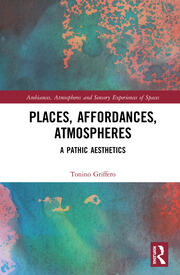This book offers a diverse understanding and practical approach towards the growing area of atmosphere research, in the context of philosophy, geography and architecture.
It begins by tracing back to the model of experience called the "pathic". Drawing on the phenomenology of theorists Hermann Schmitz and Gernot Böhme, introductory chapters offer a grounding for the beginnings of pathic research. The chapters go on to apply pathic framework to a range of practical cases from theatre studies to education. Atmospheres are often defined as affects one feels in a "lived space" and researchers are becoming more interested in the emotions we feel in natural and artificial environments across day to day life. By providing a critical re-evaluation of phenomenology and aesthetics, the book brings a series of unexplored and controversial subjects to light, opening up a new context for thinking about our everyday life and experiences inscribed within aesthetics, politics, literature, spatial practices and pedagogy and effectively merging abstract philosophy and concrete practice.
This book is particularly poignant in the emerging field of Atmosphere and New Aesthetics research. Practitioners, academics and researchers working within Cultural Geography, Aesthetics, Art and Philosophy will find this book extremely valuable.
Preface; Author's Note; Part One Pathic Aesthetics and New Phenomenology; Chapter 1 Art and Atmospheres: The Approach of A Pathic Aesthetics; Chapter 2: The Psychologistic-Introjectivistic-Reductionist Paradigm: The Source of All Errors; Chapter 3 A History of Repressions; Chapter 4: Neo-phenomenological "Therapies"; Part Two Atmospheres, Presences, Expressive Qualities; Chapter 5 Are There Inauthentic Atmospheric Feelings? The Overestimation of Intentionality; Chapter 6 Good Regressions: Mineness and Absolute Subjectivity; Chapter 7 Condemned to Sense (and Expression): Eight Theses on Atmospheres as Expressive Wholes; Chapter 8 Come Rain or Come Shine …: The (Neo)Phenomenological Will-To-Presentness; Part Three Atmospherological Exercises; Chapter 9 Architectural Affordances: The Atmospheric Authority of Spaces; Chapter 10 A House is Not a Home: Dwelling Means Cultivating Atmospheres; Chapter 11 Inclusiveness and Immersion; Chapter 12 Found or Created? The Genius Loci as an (Atmospheric) Experience; Chapter 13: Stone, Soil and Sand: Earthy Atmospheres; Chapter 14 Like Leaves in the Wind: Does Democracy Have Its Own Atmosphere?; Chapter 15 Intentionality and Unintentionality in the Pedagogical Atmosphere; Chapter 16 Theatrical Atmospheres: Much Ado About Nothing?; Bibliography; Index
Biography
Tonino Griffero is full professor of Aesthetics at the University of Rome "Tor Vergata", Italy. His most recent books (in English) are: Atmospheres. Aesthetics of Emotional Spaces (2014) and Quasi-Things: The Paradigm of Atmospheres (2017).
"With impressive erudition and energy, Tonino Griffero explores in this book the complexly subtle, important, but too often neglected role of atmospheres in aesthetics. Places, Affordances, Atmospheres: A Pathic Aesthetics is an expert treatise offering new perspectives in phenomenological aesthetics." - Richard Shusterman, author of Thinking through the Body: Essays in Somaesthetics
"Tonino Griffero takes over where some authors of my generation left a debate about "Atmosphere" (and "Stimmung") as a concept of aesthetic appreciation and analysis that had emerged and developed momentum since the late twentieth century. If we were mainly concerned with finding and fine tuning a level of abstraction required for theoretical pursuits, Griffero has reinserted the word into the intellectual environment around 1900. Surprisingly and convincingly, this "translatio" adds new philosophical complexity and even a political edge to a discussion that seemed to have reached its limits - and is now reset for a new start under different premises." - Hans Ulrich Gumbrecht Albert Guérard Professor in Literature, Emeritus Stanford University




